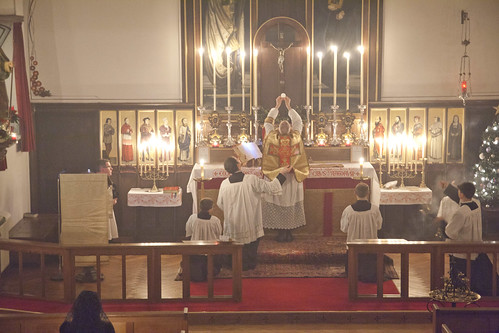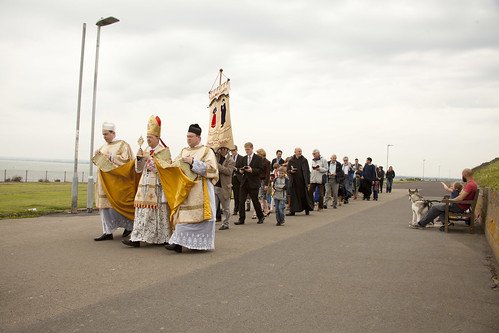 |
| Candelit Mass for the Epiphany in Oxford |
On the question of evanglisation, his point is simply that the liturgy is directed to the Church's members, not to the unconverted. He attacked the idea that
the liturgy that used to nourish the lives of Christians no longer interests us; what we need is liturgy that is pure and simply an instrument for Christianising modern pagans. (Memoirs, p382)
Again: 'What shall we give others if we have nothing left ourselves?'
The context is his opposition to the transformation of the Catholic liturgy into something it has never been before, with each change justified by appeal to sensibilities of people without any familiarity with the liturgy, people who have no ear for its poetry or symbolism: 'modern pagans'. This is fair enough, but it is an unnecessary to conclude from this that the traditional liturgy has and should have nothing to say to outsiders. Bl. Dominic Barberi's success as an evangelist among industrial workers in the North West of England was helped along, for example, by highly elaborate Corpus Christi processions, the like of which had not been seen in England since the Reformation, which non-Catholics watched with amazement in huge crowds. This, strictly speaking, was paraliturgical, but it chimes with the the experience of many converts of the pre-Conciliar era that the awe and reverence of the Catholic liturgy frequently drew them closer to the Faith.
That's not to say we should be looking to make the liturgy more didactic. I was intrigued to see a reference to Aristotle in Bouyer's discussion of this point. Looking more deeply, Aristotle was speaking specifically about the pagan liturgy of his own day. It is from a 'fragment': a reference to a lost work of Aristotle in another author's writings. Here are two: the first is what Bouyer referred to, the second appears to be about the same idea, and puts it into a slightly wider context.
Synesius, Dio. 10. 48 a. ... as Aristotle claims that those who are being initiated into the mysteries are to be expected not to learn anything but to suffer some change, to be put into a certain condition, i.e. to be fitted for some purpose.
Michael Psellus, Schol. ad Joh. Climacum (Cat. des Man. Alch. Grecs, ed. Bidez, 1928), 6. 171. I undertook to teach you what I have learned, not what I have experienced . . . the one is matter for teaching, the other for mystical experience. The first comes to men by hearing, the second comes when reason itself has experienced illumination — which Aristotle described as mysterious and akin to the Eleusinian rites (for in these he who was initiated into the mysteries was being moulded, not being taught).
Bouyer's own remark is this: 'the main business of the liturgy is not to teach us this or that lesson easily converted into pat formulas; it is to place the faithful, without them quite knowing how, into a certain state of mind which it would be perfectly fruitless to try to recreate by explaining it.' (Memoirs, p67)
(This reminds me of Newman's distinction between training and education. Training is about acquiring a mechanical skill; education is about broadening the mind. The specific bits of information conveyed in education may be a necessary part of the process, but they aren't the object of the exercise. The educated man has been changed, he is able to approach the rest of his life in a different way, not because of 'transferable skills', but because his mind has been educated.)
What happens to us when we participate in Mass? We may pick up a point of theology or two but that is not what it is all about. It is an experience, and we enter into in prayer. The point of it is the transformation of the worshipper at a spiritual level; to fit us for heaven; and it is the action of God which does this. It doesn't happen all at once, of course, but by the constant action of the liturgy over years.
Perhaps we can compare this to the experience of family life, if the family is not too dysfunctional. It is not for show; the kind of communication going on will be to an important extent inaccessible to strangers. It is important that the life of the home is for the family, not adapted as a kind of play-acting for others, because it nourishes family members. Nevertheless, a stranger, even one who doesn't have a good experience of family life of his own, can, if he encounters this (as a guest), learn something profound and helpful from it. The very naturallness of it, the very fact that it is not put on for any spectator, its authenticity, conveys something about nature of a healthy family life in a deep way, a way which goes beyond words, for family members above all, but for the guest as well.
Looking at it in this way, it is easy to see what damage can be done by the liturgy by attempting to make it 'easy to understand'.
Related in the FIUV Position Paper on the Extraordinary Form and the West, on the New Evanglisation.
 |
| Procession led by Bishop Schneider in Ramsgate, with a relic of St Augustine of Canterbury |
Great post, Dr. Shaw! There is a wealth of riches in Patristic and medieval texts on how the liturgy changes us as we participate in it, not by imparting information, but by shaping the mind, exercising the soul, training the virtues through experience. I think Fr. Boyer's opposition to liturgy as teaching must be seen against an enlightenment or rationalist notion of teaching, which is as alien to the Patristic world as it is to contemporary Thomist, Augustinian, or Wittgensteinian thought. Of course the liturgy changes and develops us; but not in a way that a purely rationalist anthropology and epistemology would recognise. Our Catholic tradition is so full of wisdom on this, wisdom that we need to retain and make more fully known. Thanks for your good work!
ReplyDeleteI have always understood the liturgy to be about how we express what we believe. Therefore belief comes first. Lex orandi, lex credendi.
ReplyDeleteThe trouble with the New Mass in it many variations, is that what we believe is not at all clear. As for the various customs which have crept in, endless hymns, lay bidders, readers, and distributors of Holy Communion, not to mention the disrespect shown for the sanctuary and of course, the now widely ignored central tabernacle, not only is it not clear what we believe but one is left with the impression that that might well have been the intention?
We certainly need some didacticism in the New Mass while perhaps just leaving the Tridentine Mass alone.